国外道德困境案例 ppt
- 格式:ppt
- 大小:2.05 MB
- 文档页数:21
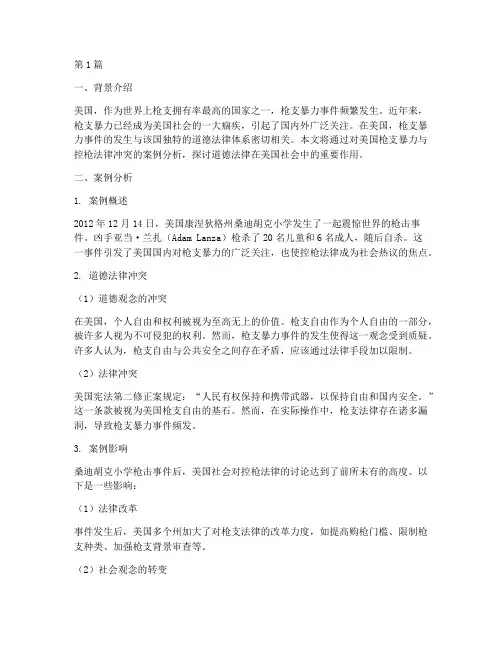
第1篇一、背景介绍美国,作为世界上枪支拥有率最高的国家之一,枪支暴力事件频繁发生。
近年来,枪支暴力已经成为美国社会的一大痼疾,引起了国内外广泛关注。
在美国,枪支暴力事件的发生与该国独特的道德法律体系密切相关。
本文将通过对美国枪支暴力与控枪法律冲突的案例分析,探讨道德法律在美国社会中的重要作用。
二、案例分析1. 案例概述2012年12月14日,美国康涅狄格州桑迪胡克小学发生了一起震惊世界的枪击事件。
凶手亚当·兰扎(Adam Lanza)枪杀了20名儿童和6名成人,随后自杀。
这一事件引发了美国国内对枪支暴力的广泛关注,也使控枪法律成为社会热议的焦点。
2. 道德法律冲突(1)道德观念的冲突在美国,个人自由和权利被视为至高无上的价值。
枪支自由作为个人自由的一部分,被许多人视为不可侵犯的权利。
然而,枪支暴力事件的发生使得这一观念受到质疑。
许多人认为,枪支自由与公共安全之间存在矛盾,应该通过法律手段加以限制。
(2)法律冲突美国宪法第二修正案规定:“人民有权保持和携带武器,以保持自由和国内安全。
”这一条款被视为美国枪支自由的基石。
然而,在实际操作中,枪支法律存在诸多漏洞,导致枪支暴力事件频发。
3. 案例影响桑迪胡克小学枪击事件后,美国社会对控枪法律的讨论达到了前所未有的高度。
以下是一些影响:(1)法律改革事件发生后,美国多个州加大了对枪支法律的改革力度,如提高购枪门槛、限制枪支种类、加强枪支背景审查等。
(2)社会观念的转变枪支暴力事件的发生使越来越多的人认识到枪支自由与公共安全之间的矛盾,促使社会观念逐渐转变。
(3)国际影响美国枪支暴力问题引起了国际社会的广泛关注,对全球枪支控制政策产生了影响。
三、结论美国枪支暴力与控枪法律冲突的案例表明,道德法律在社会中扮演着至关重要的角色。
一方面,道德观念影响着法律制定和实施;另一方面,法律在维护道德观念方面发挥着重要作用。
在我国,应借鉴美国经验,加强道德法律建设,为构建和谐社会提供有力保障。

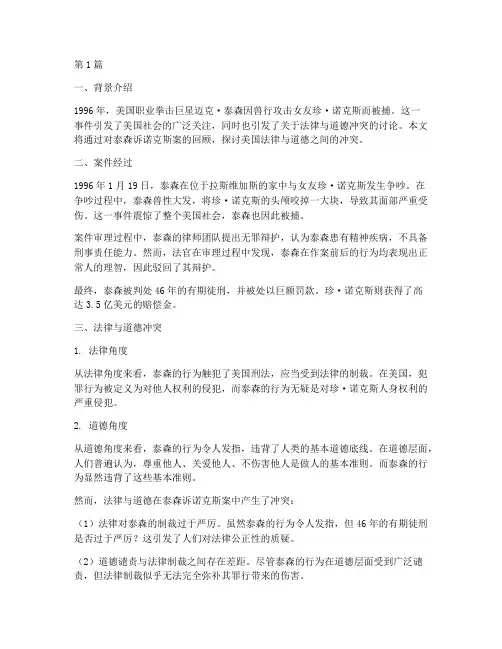
第1篇一、背景介绍1996年,美国职业拳击巨星迈克·泰森因兽行攻击女友珍·诺克斯而被捕。
这一事件引发了美国社会的广泛关注,同时也引发了关于法律与道德冲突的讨论。
本文将通过对泰森诉诺克斯案的回顾,探讨美国法律与道德之间的冲突。
二、案件经过1996年1月19日,泰森在位于拉斯维加斯的家中与女友珍·诺克斯发生争吵。
在争吵过程中,泰森兽性大发,将珍·诺克斯的头颅咬掉一大块,导致其面部严重受伤。
这一事件震惊了整个美国社会,泰森也因此被捕。
案件审理过程中,泰森的律师团队提出无罪辩护,认为泰森患有精神疾病,不具备刑事责任能力。
然而,法官在审理过程中发现,泰森在作案前后的行为均表现出正常人的理智,因此驳回了其辩护。
最终,泰森被判处46年的有期徒刑,并被处以巨额罚款。
珍·诺克斯则获得了高达3.5亿美元的赔偿金。
三、法律与道德冲突1. 法律角度从法律角度来看,泰森的行为触犯了美国刑法,应当受到法律的制裁。
在美国,犯罪行为被定义为对他人权利的侵犯,而泰森的行为无疑是对珍·诺克斯人身权利的严重侵犯。
2. 道德角度从道德角度来看,泰森的行为令人发指,违背了人类的基本道德底线。
在道德层面,人们普遍认为,尊重他人、关爱他人、不伤害他人是做人的基本准则。
而泰森的行为显然违背了这些基本准则。
然而,法律与道德在泰森诉诺克斯案中产生了冲突:(1)法律对泰森的制裁过于严厉。
虽然泰森的行为令人发指,但46年的有期徒刑是否过于严厉?这引发了人们对法律公正性的质疑。
(2)道德谴责与法律制裁之间存在差距。
尽管泰森的行为在道德层面受到广泛谴责,但法律制裁似乎无法完全弥补其罪行带来的伤害。
四、案例分析1. 法律与道德的相互关系泰森诉诺克斯案揭示了法律与道德之间的相互关系。
一方面,法律是维护社会秩序、保障公民权益的重要工具,应当对违法行为进行制裁;另一方面,道德是引导人们行为的重要准则,对法律具有补充和制约作用。
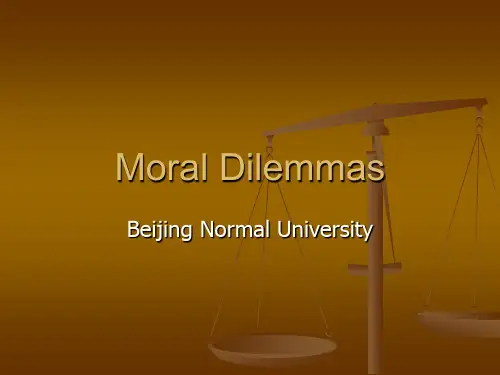
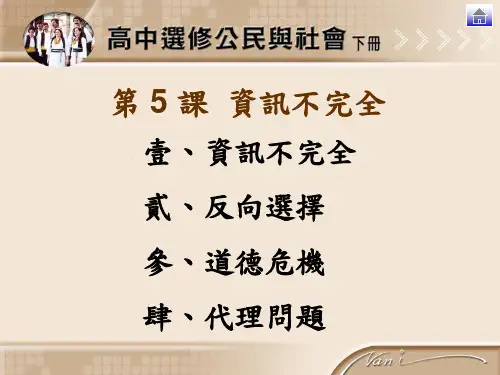
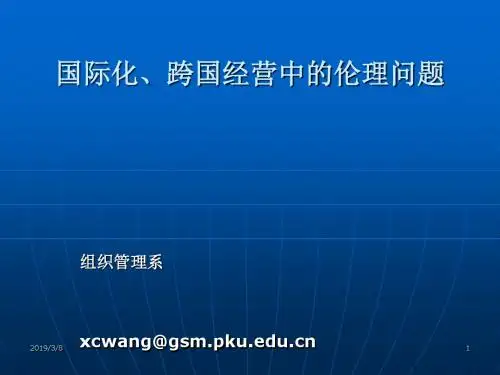
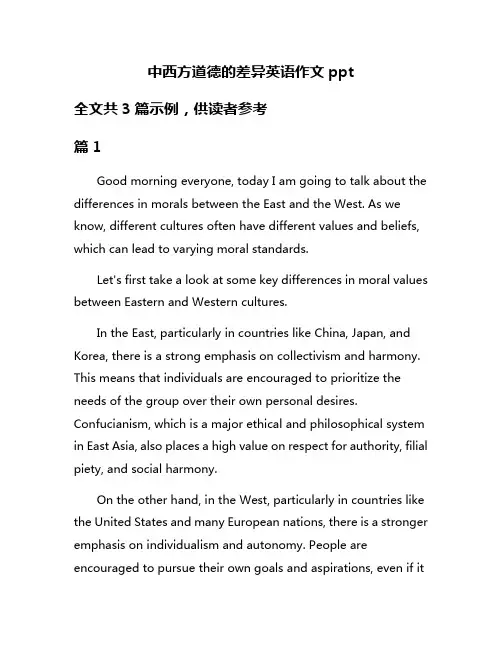
中西方道德的差异英语作文ppt全文共3篇示例,供读者参考篇1Good morning everyone, today I am going to talk about the differences in morals between the East and the West. As we know, different cultures often have different values and beliefs, which can lead to varying moral standards.Let's first take a look at some key differences in moral values between Eastern and Western cultures.In the East, particularly in countries like China, Japan, and Korea, there is a strong emphasis on collectivism and harmony. This means that individuals are encouraged to prioritize the needs of the group over their own personal desires. Confucianism, which is a major ethical and philosophical system in East Asia, also places a high value on respect for authority, filial piety, and social harmony.On the other hand, in the West, particularly in countries like the United States and many European nations, there is a stronger emphasis on individualism and autonomy. People are encouraged to pursue their own goals and aspirations, even if itmeans prioritizing their own needs over the needs of the group. Western societies also tend to value personal freedoms, equality, and justice.These differences in moral values can be seen in various aspects of everyday life, including family relationships, social interactions, and even political ideologies.For example, in Eastern cultures, children are expected to show respect for their elders and to act in ways that preserve family harmony. It is common for younger family members to make sacrifices for the sake of their parents and grandparents. In contrast, in Western cultures, children are encouraged to pursue their own dreams and aspirations, even if it means breaking away from traditional family expectations.In terms of social interactions, Eastern cultures tend to place a strong emphasis on maintaining social harmony and avoiding conflict. It is common for people to avoid confrontation and to prioritize the feelings of others over their own desires. In contrast, Western cultures often value open communication and assertiveness. People are encouraged to speak their minds and to stand up for their beliefs, even if it means causing temporary friction in relationships.When it comes to political ideologies, Eastern cultures tend to prioritize stability and order, often at the expense of individual freedoms. Authoritarian regimes are common in many East Asian countries, where the government exerts strict control over the population in order to maintain social harmony. In contrast, Western cultures tend to prioritize personal freedoms, democracy, and the rule of law. People are encouraged to participate in the political process and to hold their leaders accountable for their actions.In conclusion, while there are certainly differences in moral values between the East and the West, it is important to recognize that these differences are not necessarily good or bad. They simply reflect the unique cultural traditions and historical experiences of each region. By understanding and appreciating these differences, we can learn to respect and learn from one another, ultimately leading to a more tolerant and harmonious global society. Thank you.篇2Title: Differences in Moral Values between Eastern and Western CulturesIntroduction- The concept of morality varies greatly across different cultures, with Eastern and Western societies often demonstrating contrasting views on what is considered right or wrong.- This presentation will explore the key differences in moral values between Eastern and Western cultures, and how these differences impact social norms, behaviors, and attitudes.Eastern Moral Values- In Eastern cultures, such as those found in Asian countries like China, Japan, and Korea, moral values are often influenced by Confucianism, Buddhism, and Taoism.- Key moral values in Eastern cultures include filial piety, respect for elders, humility, harmony, and collectivism.- Concepts like the interconnectedness of all beings, the importance of maintaining balance and order in society, and the value of self-discipline are central to Eastern moral values.Western Moral Values- In Western cultures, such as those found in Europe and North America, moral values are often influenced byJudeo-Christian traditions, individualism, and the Enlightenment philosophy.- Key moral values in Western cultures include individual rights, freedom, equality, justice, and autonomy.- Concepts like the importance of personal choice, the pursuit of happiness, the protection of individual liberties, and the rule of law are central to Western moral values.Key Differences in Moral Values- One of the key differences between Eastern and Western moral values is the emphasis on individual vs. collective interests. Eastern cultures prioritize the needs of the group over the individual, while Western cultures prioritize individual rights and freedoms.- Another key difference is the level of tolerance for ambiguity. Eastern cultures tend to value ambiguity and uncertainty, while Western cultures often seek clarity, consistency, and predictability in moral decisions.- Additionally, Eastern cultures often value harmony, humility, and deference to authority, while Western cultures value assertiveness, independence, and critical thinking.Impact on Society- The differences in moral values between Eastern and Western cultures have significant impacts on social norms, behaviors, and attitudes.- These differences can lead to misunderstandings, conflicts, and cultural clashes between individuals from different cultural backgrounds.- Understanding and appreciating the diversity of moral values across cultures can help promote intercultural communication, cooperation, and respect.Conclusion- In conclusion, the differences in moral values between Eastern and Western cultures illustrate the diversity and complexity of human societies.- By recognizing and acknowledging these differences, we can foster a greater sense of cultural awareness, empathy, and mutual understanding in an increasingly globalized world.篇3Title: Differences between Eastern and Western Moral ValuesIntroduction:Throughout history, different cultures have developed unique sets of moral values that shape the way individuals perceive and interact with the world around them. The contrast between Eastern and Western moral values has been a topic of interest for scholars and researchers, as it sheds light on the diverse perspectives and ethical frameworks that govern human behavior.1. Individualism vs. CollectivismOne of the key distinctions between Eastern and Western moral values lies in the emphasis on individualism versus collectivism. In the Western world, individualism is highly valued, with a focus on personal achievement, autonomy, and independence. In contrast, Eastern cultures often prioritize collectivism, emphasizing the importance of community, family, and social harmony.2. Respect for AuthorityAnother significant difference between Eastern and Western moral values is the attitude towards authority. In Western societies, there is often a healthy skepticism towards authority figures, with an emphasis on challenging and questioning established norms and rules. In contrast, Eastern cultures tend toplace a higher value on respect for authority, elders, and traditional hierarchies.3. Confucian Values vs. Judeo-Christian ValuesThe moral values of Eastern and Western cultures are often influenced by their respective religious and philosophical traditions. For example, Confucian values have had a profound impact on Eastern moral philosophy, emphasizing virtues such as filial piety, respect for elders, and loyalty to one's community. In contrast, Judeo-Christian values in Western societies prioritize concepts such as justice, compassion, and the inherent dignity of every individual.4. Views on Truth and DeceptionEastern and Western moral values also differ in their attitudes towards truth and deception. In Western cultures, honesty and transparency are often perceived as integral moral virtues, with a strong emphasis on telling the truth and upholding one's commitments. In Eastern cultures, however, there may be more flexibility in the perception of truth, with an acceptance of white lies and the use of deception for the sake of social harmony.Conclusion:In conclusion, the differences between Eastern and Western moral values reflect the diverse cultural, religious, and philosophical traditions that have shaped human societies over centuries. By understanding and appreciating these differences, we can gain a deeper insight into the complex tapestry of human ethics and behaviors, and foster greater cultural understanding and empathy in an increasingly interconnected world.。
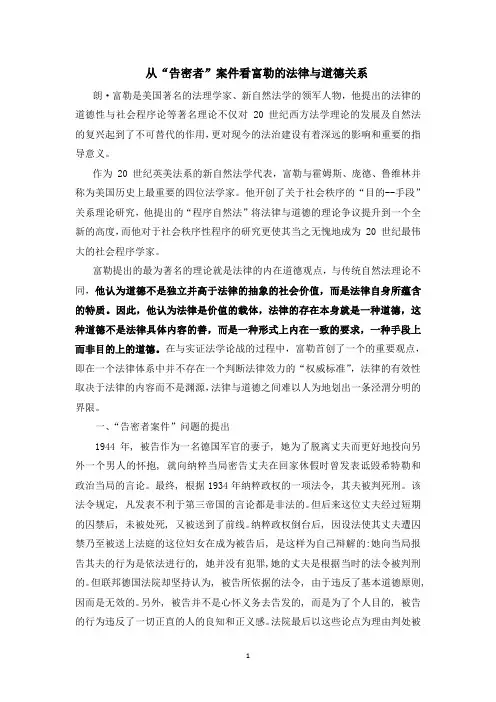
从“告密者”案件看富勒的法律与道德关系朗·富勒是美国著名的法理学家、新自然法学的领军人物,他提出的法律的道德性与社会程序论等著名理论不仅对 20 世纪西方法学理论的发展及自然法的复兴起到了不可替代的作用,更对现今的法治建设有着深远的影响和重要的指导意义。
作为 20 世纪英美法系的新自然法学代表,富勒与霍姆斯、庞德、鲁维林并称为美国历史上最重要的四位法学家。
他开创了关于社会秩序的“目的--手段”关系理论研究,他提出的“程序自然法”将法律与道德的理论争议提升到一个全新的高度,而他对于社会秩序性程序的研究更使其当之无愧地成为 20 世纪最伟大的社会程序学家。
富勒提出的最为著名的理论就是法律的内在道德观点,与传统自然法理论不同,他认为道德不是独立并高于法律的抽象的社会价值,而是法律自身所蕴含的特质。
因此,他认为法律是价值的载体,法律的存在本身就是一种道德,这种道德不是法律具体内容的善,而是一种形式上内在一致的要求,一种手段上而非目的上的道德。
在与实证法学论战的过程中,富勒首创了一个的重要观点,即在一个法律体系中并不存在一个判断法律效力的“权威标准”,法律的有效性取决于法律的内容而不是渊源,法律与道德之间难以人为地划出一条泾渭分明的界限。
一、“告密者案件”问题的提出1944年, 被告作为一名德国军官的妻子, 她为了脱离丈夫而更好地投向另外一个男人的怀抱, 就向纳粹当局密告丈夫在回家休假时曾发表诋毁希特勒和政治当局的言论。
最终, 根据1934年纳粹政权的一项法令, 其夫被判死刑。
该法令规定, 凡发表不利于第三帝国的言论都是非法的。
但后来这位丈夫经过短期的囚禁后, 未被处死, 又被送到了前线。
纳粹政权倒台后, 因设法使其丈夫遭囚禁乃至被送上法庭的这位妇女在成为被告后, 是这样为自己辩解的:她向当局报告其夫的行为是依法进行的, 她并没有犯罪,她的丈夫是根据当时的法令被判刑的。
但联邦德国法院却坚持认为, 被告所依据的法令, 由于违反了基本道德原则, 因而是无效的。


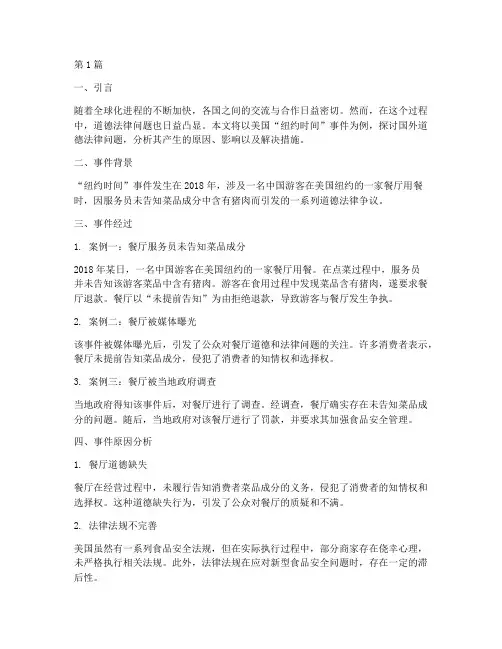
第1篇一、引言随着全球化进程的不断加快,各国之间的交流与合作日益密切。
然而,在这个过程中,道德法律问题也日益凸显。
本文将以美国“纽约时间”事件为例,探讨国外道德法律问题,分析其产生的原因、影响以及解决措施。
二、事件背景“纽约时间”事件发生在2018年,涉及一名中国游客在美国纽约的一家餐厅用餐时,因服务员未告知菜品成分中含有猪肉而引发的一系列道德法律争议。
三、事件经过1. 案例一:餐厅服务员未告知菜品成分2018年某日,一名中国游客在美国纽约的一家餐厅用餐。
在点菜过程中,服务员并未告知该游客菜品中含有猪肉。
游客在食用过程中发现菜品含有猪肉,遂要求餐厅退款。
餐厅以“未提前告知”为由拒绝退款,导致游客与餐厅发生争执。
2. 案例二:餐厅被媒体曝光该事件被媒体曝光后,引发了公众对餐厅道德和法律问题的关注。
许多消费者表示,餐厅未提前告知菜品成分,侵犯了消费者的知情权和选择权。
3. 案例三:餐厅被当地政府调查当地政府得知该事件后,对餐厅进行了调查。
经调查,餐厅确实存在未告知菜品成分的问题。
随后,当地政府对该餐厅进行了罚款,并要求其加强食品安全管理。
四、事件原因分析1. 餐厅道德缺失餐厅在经营过程中,未履行告知消费者菜品成分的义务,侵犯了消费者的知情权和选择权。
这种道德缺失行为,引发了公众对餐厅的质疑和不满。
2. 法律法规不完善美国虽然有一系列食品安全法规,但在实际执行过程中,部分商家存在侥幸心理,未严格执行相关法规。
此外,法律法规在应对新型食品安全问题时,存在一定的滞后性。
3. 消费者维权意识不足部分消费者在遇到食品安全问题时,由于维权意识不足,未能及时采取法律手段维护自身权益。
五、事件影响1. 对餐厅的影响该事件导致餐厅声誉受损,生意受到影响。
同时,餐厅还需承担罚款等经济损失。
2. 对消费者的影响该事件提高了消费者对食品安全问题的关注度,增强了消费者的维权意识。
3. 对美国食品安全的影响该事件暴露了美国食品安全监管的不足,促使政府加强对食品安全问题的关注和监管。
第1篇一、案件背景近年来,随着全球化进程的加快,跨文化交流日益频繁,然而随之而来的道德法律问题也日益凸显。
在美国,亚裔歧视案件屡见不鲜,其中一起备受关注的案件便是王女士诉麦当劳公司案。
该案件引发了社会对道德法律问题的广泛关注,下面将详细介绍此案。
二、案件经过王女士,一名来自中国的留学生,在美国某城市的一家麦当劳餐厅就餐。
在点餐过程中,王女士与餐厅服务员发生口角。
服务员在争执中辱骂王女士,并称其是“滚回中国去”。
王女士感到十分愤怒,遂向麦当劳公司投诉。
麦当劳公司对此事高度重视,立即展开调查。
经调查,该公司发现涉事服务员确实存在辱骂王女士的行为。
然而,在处理此事时,麦当劳公司却采取了息事宁人的态度,仅对涉事服务员进行了口头警告,并未对王女士进行道歉或赔偿。
王女士对此处理结果感到极度不满,认为麦当劳公司的做法是对亚裔歧视行为的纵容。
于是,她决定将麦当劳公司告上法庭,要求该公司公开道歉、赔偿损失,并承担相应的社会责任。
三、案件争议焦点1. 麦当劳公司是否构成侵权?王女士认为,麦当劳公司作为涉事餐厅的经营者,在发生辱骂事件后,未采取有效措施制止歧视行为,反而对涉事服务员进行了轻微处罚,这显然是对亚裔歧视行为的纵容。
因此,麦当劳公司应承担侵权责任。
2. 麦当劳公司是否应承担社会责任?王女士认为,作为一家跨国企业,麦当劳公司有责任维护社会公正,抵制歧视行为。
然而,麦当劳公司在此次事件中的处理方式,显然未能履行其社会责任。
3. 王女士的诉讼请求是否合理?王女士要求麦当劳公司公开道歉、赔偿损失,并承担社会责任。
这一诉讼请求是否合理,是本案的争议焦点之一。
四、案件判决经过审理,法院认为,麦当劳公司在此次事件中的处理方式确实存在不当之处,未能充分履行社会责任。
因此,法院判决麦当劳公司:1. 向王女士公开道歉;2. 赔偿王女士精神损失费;3. 在其官方网站和社交媒体上发布道歉声明,倡导抵制歧视行为。
五、案件启示王女士诉麦当劳公司案引发了人们对道德法律问题的关注,以下为该案带来的启示:1. 企业应承担社会责任,抵制歧视行为。